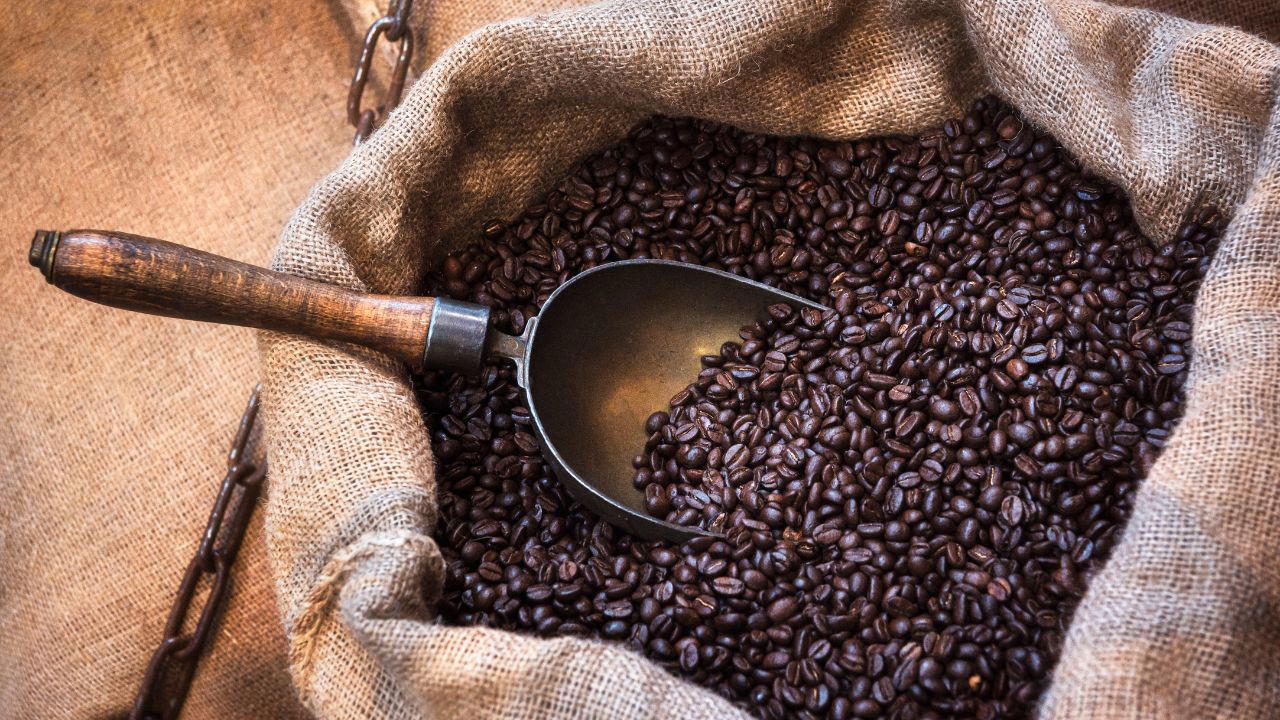Learn how long to store coffee beans and whether they are raw or roasted and the type of storage to ensure they retain maximum freshness and shelf life.

Coffee is one of the most beloved beverages in the world. The USA tops the list as the country that drinks the most coffee in the world.
Did you know that coffee beans are the main ingredient in coffee? They are the seeds or berries that are used to make coffee.
Coffee lovers prefer to grind coffee beans to make their coffee freshly. But coffee beans are expensive and difficult to store. They may lose their flavor and aroma if not kept properly after a few days.
In this article, we will provide you with an introduction to how long coffee beans last.
Factors That Affect The Shelf Life Of Coffee Beans
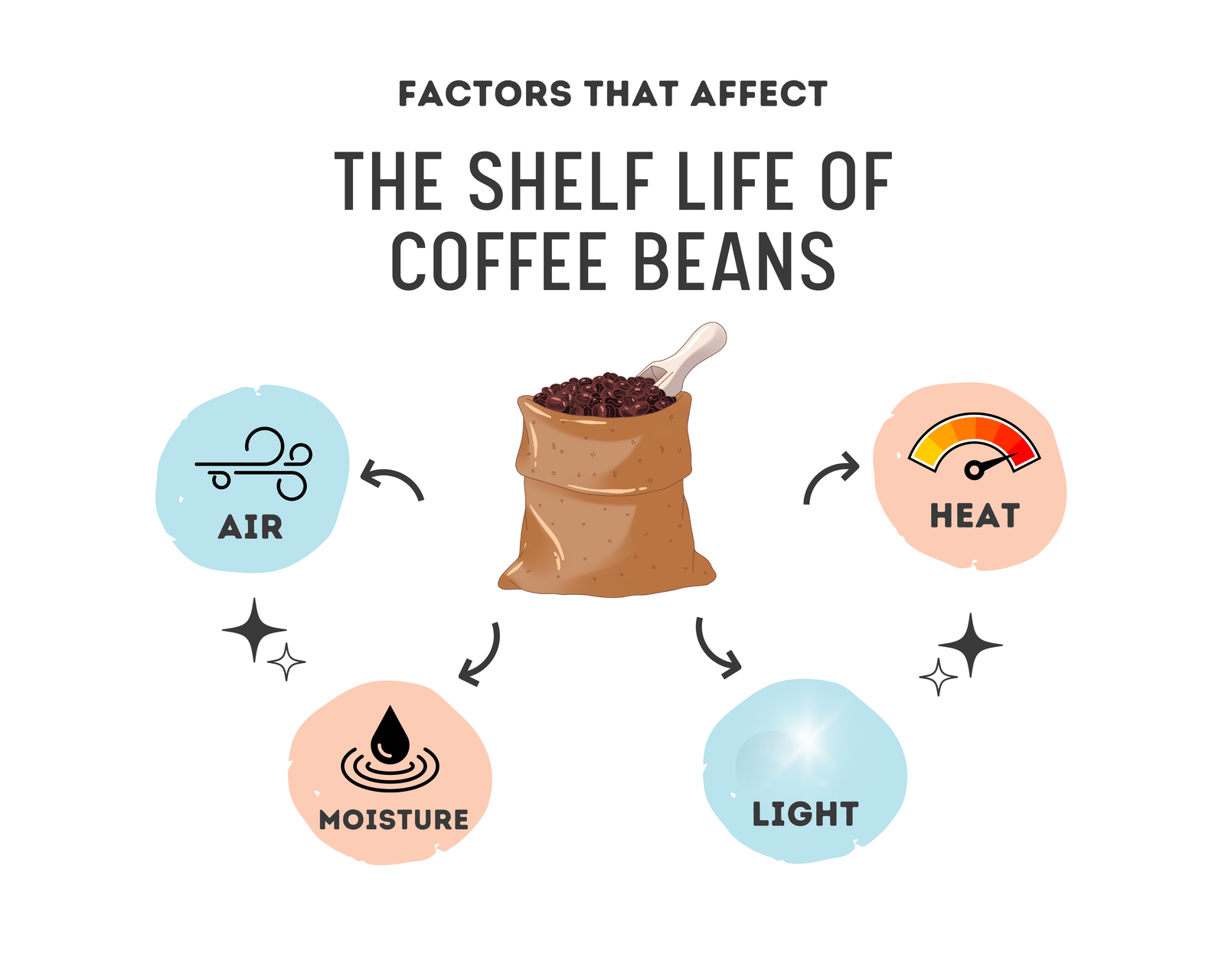
You’ve spent a good amount of money on buying the best coffee beans.
But if you are not careful about how you store them, you’ll be disappointed with the results.
So, let’s run through the factors that affect the shelf life of coffee beans.
According to the National Coffee Association, the main factors that affect the quality and taste of coffee beans are:
- Heat
Coffee beans are best stored at room temperature or even in a cooler place like in a kitchen cabinet.
Put them too close to the stove or oven, the heat will affect the beans and cause them to lose their flavor and aroma.
- Air
When air seeps through the packaging, oxidation occurs where oxygen reacts with the coffee beans and makes them lose their fresh aroma and taste.
That’s why invest in airtight packaging like opaque containers or resealable bags with air valves.
These bags help keep oxygen from entering and reacting with the coffee beans while making a vent for the carbon dioxide to escape from the beans.
- Moisture
Water content from the air or humidity can cause coffee beans to become stale and moldy.
Once moisture comes in contact with coffee beans, the flavor will lose its original intensity.
You should not only use airtight containers to store coffee beans but also keep the container in a dry place, away from any source of moisture.
- Light
Direct light also affects the quality and shelf life of coffee beans by triggering photodegradation whereby molecules are broken down and the taste and aroma of the coffee beans change.
When light contacts the coffee beans, the oxidation process takes place faster and disintegrates the aroma oils from the coffee beans, resulting in a loss of flavor.
What’s The Shelf Life Of Whole Roasted Coffee Beans?
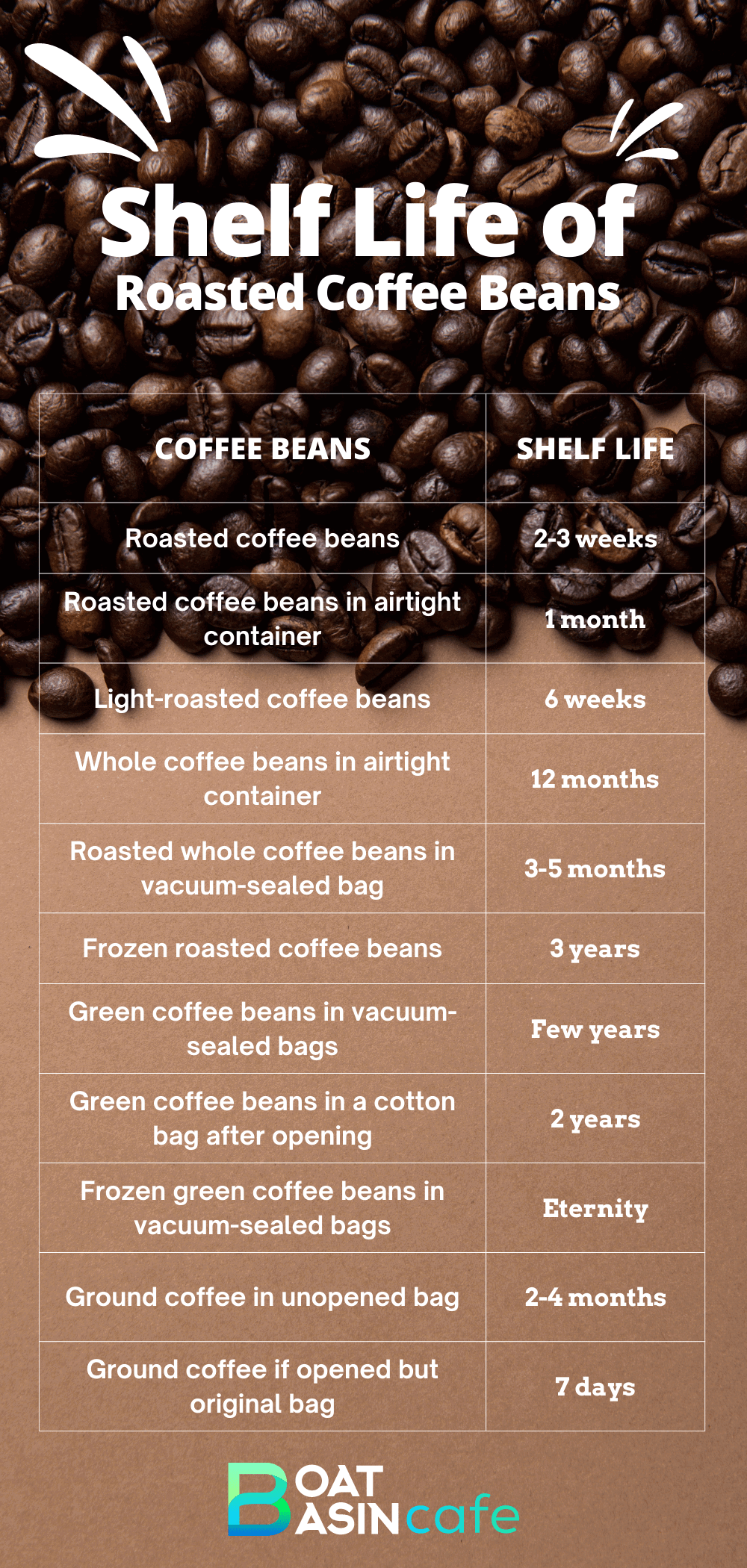
Roasted coffee beans last a long time. Because the whole roasted coffee beans are dry, there is very little chance of mold growth, unless you keep the beans in a moist place.
Freshly roasted coffee beans remain fresh for two to three weeks.
If you store them in an airtight, opaque container with a one-way valve, you can extend their freshness window to one month.
That said, roasted coffee beans won’t last forever even if you store them in airtight canisters and keep them in a dark and dry space. Beyond a specific time, they will lose their flavor and aroma.
Light vs Dark Roasted Coffee Beans
The freshest state of whole roasted coffee beans varies from bean to bean. Compared to light-roasted coffee beans, dark-roasted coffee beans stale faster.
That’s because dark roasted beans have been roasted for a longer time, cracking them open, making them more porous, and releasing more oils to the surface that react with the oxygen in the air faster. This makes them lose their fresh aroma and taste sooner.
Lightly roasted coffee beans last up to six weeks after the roasting date. Due to a shorter roasting time, lightly roasted coffee beans have a longer shelf life since the coffee pods are not cracked and can seal in all the aroma and flavor.
Different Coffee Storage Methods (Impact on Coffee Flavor)
| Storage Method | Impact on Coffee Flavor |
|---|---|
| Room Temperature | Poor flavor preservation, coffee can become stale and develop off-flavors |
| Refrigeration | Can extend the shelf life of coffee, but can also lead to moisture buildup and loss of flavor |
| Freezing | Coffee can last for several months, but the quality will deteriorate due to freezer burn and loss of aroma |
| Vacuum Sealing | Effective at preserving flavor, as it removes air and prevents moisture from entering the bag |
| Airtight Container | Good for short-term storage, but can lead to buildup of moisture and gases that can alter the taste of the coffee |
✍️ Note: It’s best to store coffee in a cool, dark place and to consume it within 2-3 weeks of roasting for the best flavor.
The storage method has a lot to do with retaining the freshness of roasted whole coffee beans.
Within 12 months after the roast date, whole coffee beans will still be fresh if stored in a one-way valve nitrogen-flushed bag or a simple pouch with a valve.
Nitrogen flushing is a process by which oxygen is replaced by nitrogen from food product packaging. Since nitrogen doesn’t react with food or change its texture, flavor, or taste, they stay fresher for a longer period.
Moreover, nitrogen is a denser gas than oxygen and surrounds the food products and protects them in transit or on the shelf.
On the other hand, vacuum sealing simply removes the air from the packaging before it’s sealed. Nitrogen or any other gas is absent from such sealing.
The shelf life of roasted whole beans can be extended to three to five months when they are vacuum-sealed. You can do this at home with the help of a vacuum sealer.
If properly frozen, roasted coffee can have up to three years of shelf life.
However, these should be used within a week after taking them out of the freezer.
How Long To Store Green Coffee Beans?
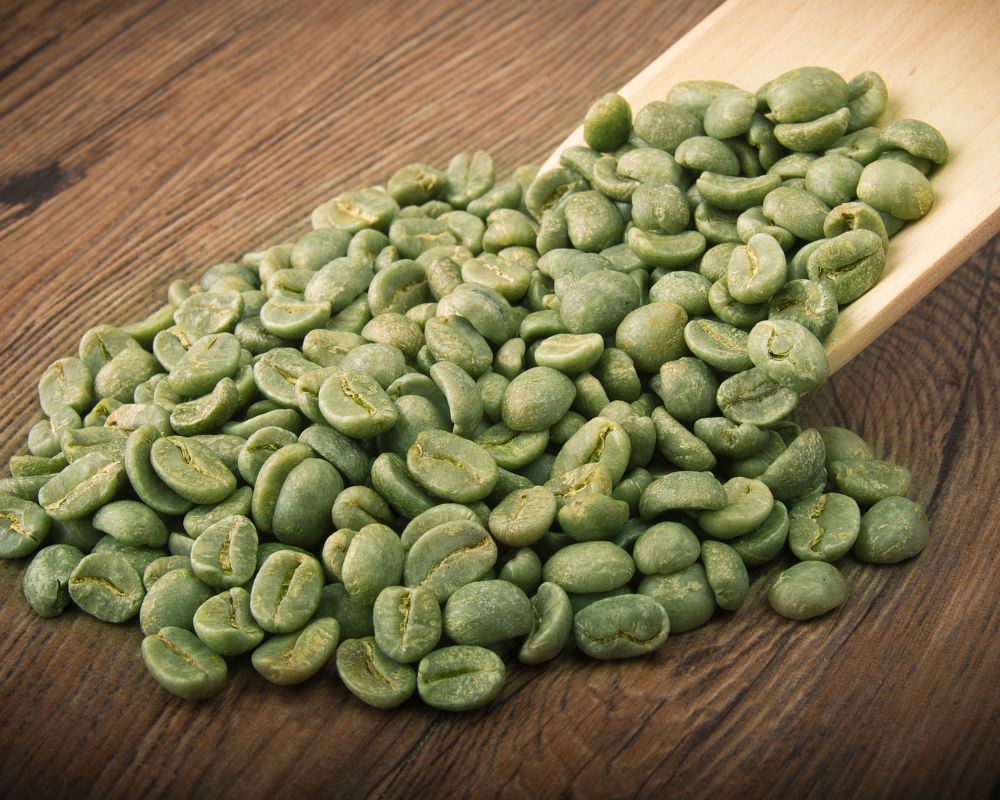
Green coffee beans are unroasted coffee beans that come in hessian sacks to the coffee roasters.
These unroasted coffee beans stay fresher for a longer time than roasted or ground coffee. This is why many prefer to buy green coffee beans and roast them at home.
These raw coffee beans can last for up to a few years if stored inside a vacuum-sealed bag and at room temperature.
Always store coffee in an airtight, opaque container in a place away from heat, light, air, and moisture, preferably in a kitchen cabinet.
When green coffee beans are exposed to the elements, they lose their flavor.
Stored properly, green coffee beans last up to two years after being opened and stored in a cotton/burlap bag in a cool, dry place. Avoid placing the beans in direct sunlight.
If green coffee beans are frozen in vacuum-sealed bags, they will last for eternity. That’s because the beans are protected from oxidation or exposure to light or other odors – the ideal condition to keep your raw coffee beans fresh for years.
But it’s difficult to keep your freezer space occupied for so long.
Moreover, if you keep all the green coffee beans in the same bag in the freezer, thawing them and then refreezing them will take a toll on the aroma and taste.
Instead, divide smaller portions of the coffee per week and put them away in small freezer bags. This way, you will use them up at the right them without having to worry about the freshness of the beans.
24 hours before you roast the raw coffee beans, take out one bag from the freezer and roast them for the whole week.
Pro Tip: If you’re planning to buy green coffee beans for home, don’t buy more than a year’s worth of them to retain maximum freshness.
How To Keep Ground Coffee Fresh
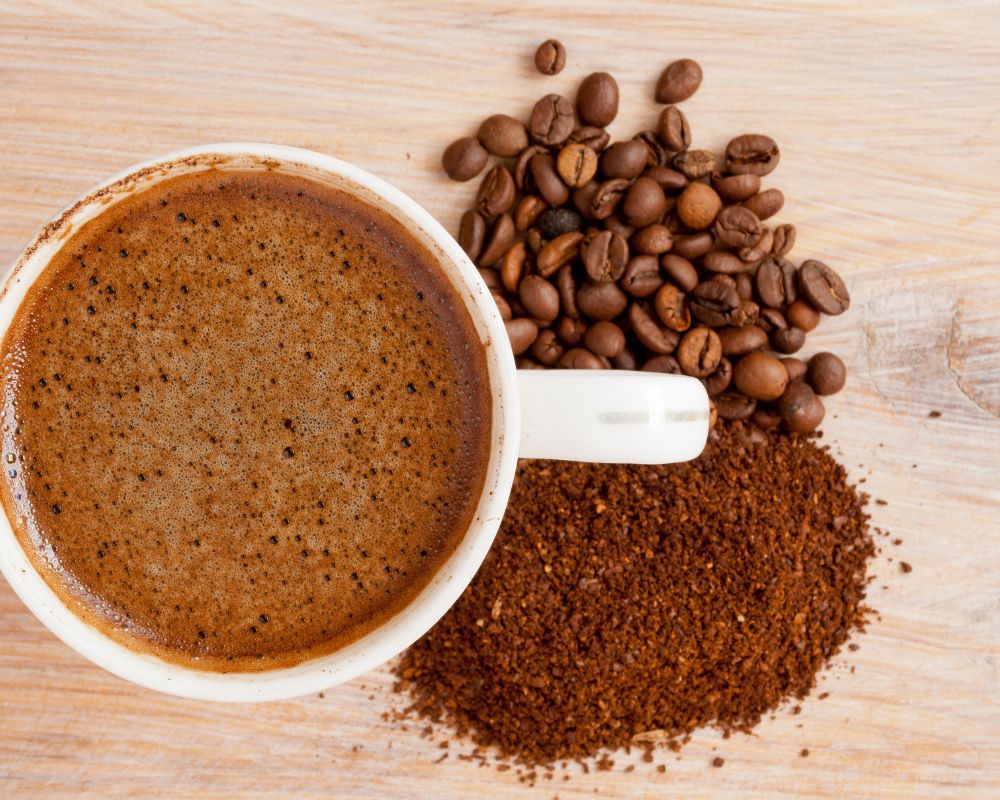
There are many people like me who don’t have a coffee burr at home and prefer to buy fresh ground coffee.
Ground roasted coffee lasts approximately 2 to 4 months if stored in an unopened bag.
It can lose its flavor within 15 minutes when exposed to air as ground coffee has a larger surface area through which it loses its oils and aroma.
If maintained in its original packaging after opening, ground coffee should ideally be consumed within a week.
By keeping ground coffee in an airtight container, you may extend its freshness.
You may also like: Do Coffee Grounds Go Bad? Find Out the Truth!
How Does Coffee Degassing Affect Shelf Life?
Did you know that during and right after the process of roasting coffee beans a chemical reaction takes place that releases carbon dioxide from the freshly roasted beans?
Degassing is the process where all the carbon dioxide from the roasted beans is released over a period of time.
This not only has an impact on the taste of the brew but also on the shelf life of the coffee beans.
Coffee beans emit gases more quickly in the early days after roasting.
The newly roasted grounds release CO2 gas throughout the brewing process, creating bubbles.
These bubbles may interfere with the water’s ability to contact the ground beans, which could result in uneven extraction.
That’s why it’s advised to wait for a few days for the coffee to degas after roasting before you proceed to grinding it and making a cup of coffee.
This time frame could range from one to five days, depending on the brewing method.
For instance, if you use a French press to brew your coffee, your coffee beans are ready for use one to two days after roasting.
Wait for five to seven days following the roasting date before using the beans for espresso.
And if you are into pour-over coffee, bubbles from the freshly roasted coffee are a sign of freshness and should be appreciated.
😀 Fun Fact: Coffee beans tend to lose their flavor slower after roasting and during degassing.
So, if you want to know if the pack of roasted coffee beans you just got is fresh enough, simply put them in a plastic Ziploc bag and press out as much air as possible.
Seal the bag and leave it overnight.
If you find out in the morning that the plastic bag has filled out with air, that means the coffee beans are freshly roasted and still degassing.
With your mind at ease, it’s best to store your roasted coffee beans in a coffee bean container with a CO2 valve.
Tips To Store Coffee Beans

If you want to find out how long to keep coffee beans after opening, follow the tips below.
- Buy fresh coffee beans from a nearby roaster that roasts in small batches.
- Buy roasted whole coffee beans instead of ground coffee.
- Grind coffee beans at home using a coffee grinder. This way, the coffee beans stay fresh for longer.
- Grind coffee only when you need them as storing ground coffee will cause it to go stale.
- The simplest solution is just to keep them in there if your coffee is packaged in an opaque resealable bag. Otherwise, use an opaque, airtight container to store the coffee beans to prevent exposure to light.
- Avoid bulk buying coffee beans as the quality decreases over time.
- Avoid refrigerating coffee beans as this will affect their smell and taste.
- Put coffee beans in double bags and store them in the freezer if you’re not going to use them anytime soon. This will prevent moisture from coming in contact with the coffee beans.
How To Detect Stale Coffee Beans
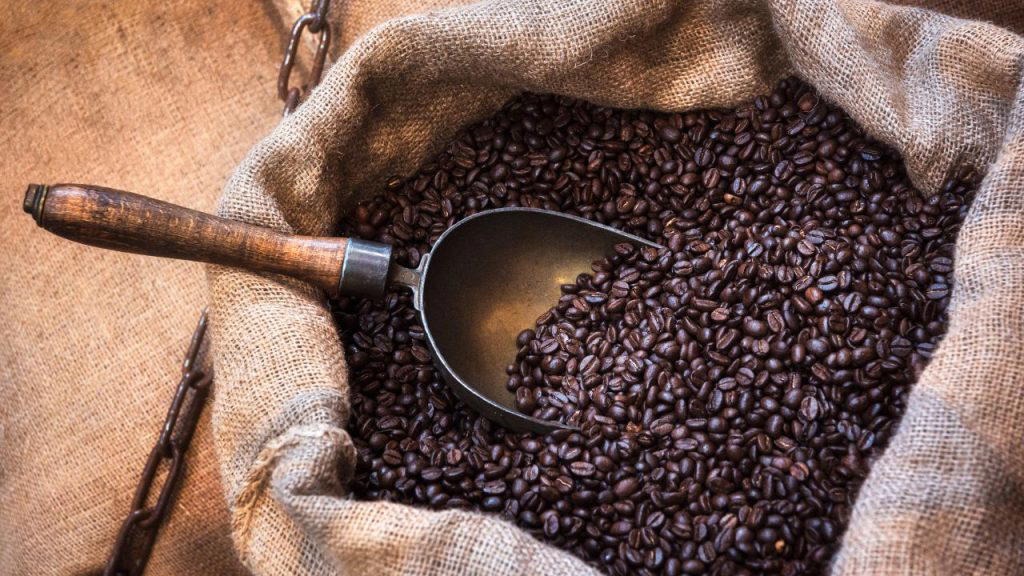
These are the top telltale signs that your coffee beans have gone stale.
- Residue
Take some coffee beans in your hands. If you see residue on your hands, that’s a sure sign they have become stale.
- Smell
If the coffee beans don’t give off their usual aroma, they are not fresh anymore.
- Taste
A cup of coffee that leaves a bitter aftertaste and smells nothing of the caramel, toffee, or nutty flavors that you were expecting is most likely stale.
- Looks
By just looking at the coffee beans, you can tell if they’re fresh or not.
Fresh coffee beans release oil that gives them a sheen.
If the sheen is missing, the coffee beans are not fresh anymore.
Moreover, if you notice mold on coffee beans, you need to throw them out.
- Packaging
Coffee beans need to release gas after they have been roasted. So, look for air valves or holes in the packaging.
If there are none, the coffee beans inside have indeed gone stale.
The Bottom Line
The key to keeping coffee beans fresh is to store them well.
Even beyond the expiration date on the bag, you can safely use coffee beans if you have stored them in an airtight container.
Remember that any contact with light, air, heat, and moisture will cause coffee beans to lose their fresh taste and even become moldy.
Or, if you bought coffee beans in bulk, freeze them in freezer bags and they’ll be fine.
FAQs
How Do You Store Whole Coffee Beans Long Term?
You can either use a vacuum-sealed bag or store whole coffee beans long term in an airtight and opaque container.
Vacuum-packed roasted whole coffee beans will last for three to five months.
Roasted coffee beans, if frozen properly in vacuum-sealed bags, will last for at least two to three years.
How Long Do Raw Coffee Beans Last?
Raw coffee beans in a vacuum-sealed bag will last for a few years.
They last for up to two years after opening and storing in a burlap or cotton bag in a dry, cool place.
Frozen raw coffee beans in vacuum-sealed bags will last forever.
Do Coffee Whole Beans Go Bad?
No, coffee whole beans do not go bad like for example, fruit or other foods that contain moisture and will get moldy.
Coffee beans are dry and although they might lose their sheen, aroma, and taste due to oxidation, they don’t go bad.
Why Do Coffee Beans Last Longer Than Ground Coffee?
Coffee beans release oil and aroma when they are roasted.
When coffee beans are ground, the surface area expands, releasing more flavors and aroma.
Because these come more in contact with the air in ground coffee, it lasts for up to a few weeks or a month.
On the other hand, the oils and aroma are trapped inside freshly roasted coffee beans, making these last longer – up to 3 months.
Can I Freeze Fresh Coffee?
It is not advisable to freeze coffee since it may occasionally result in a flat profile and may lessen the intensity of the fragrance, oils, and flavor.
Choose a small batch roaster that freshly hand roasts coffee daily so that your cup of coffee has the freshest taste and fragrance possible.
Store fresh coffee in an airtight container and keep it in a cool, dry place.
